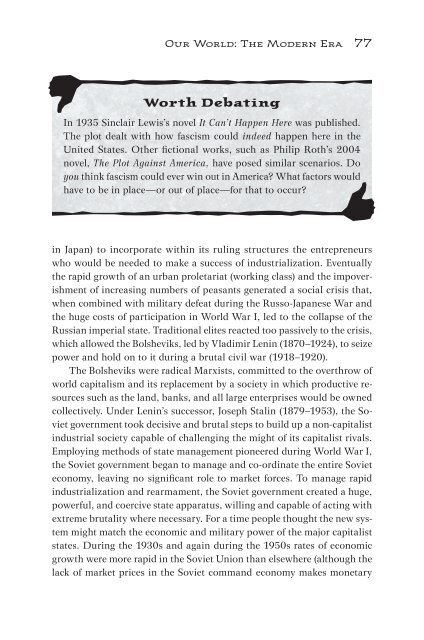This Fleeting World
This Fleeting World
This Fleeting World
Create successful ePaper yourself
Turn your PDF publications into a flip-book with our unique Google optimized e-Paper software.
Our <strong>World</strong>: The Modern Era 77<br />
Worth Debating<br />
In 1935 Sinclair Lewis’s novel It Can’t Happen Here was published.<br />
The plot dealt with how fascism could indeed happen here in the<br />
United States. Other fictional works, such as Philip Roth’s 2004<br />
novel, The Plot Against America, have posed similar scenarios. Do<br />
you think fascism could ever win out in America? What factors would<br />
have to be in place—or out of place—for that to occur?<br />
in Japan) to incorporate within its ruling structures the entrepreneurs<br />
who would be needed to make a success of industrialization. Eventually<br />
the rapid growth of an urban proletariat (working class) and the impoverishment<br />
of increasing numbers of peasants generated a social crisis that,<br />
when combined with military defeat during the Russo-Japanese War and<br />
the huge costs of participation in <strong>World</strong> War I, led to the collapse of the<br />
Russian imperial state. Traditional elites reacted too passively to the crisis,<br />
which allowed the Bolsheviks, led by Vladimir Lenin (1870–1924), to seize<br />
power and hold on to it during a brutal civil war (1918–1920).<br />
The Bolsheviks were radical Marxists, committed to the overthrow of<br />
world capitalism and its replacement by a society in which productive resources<br />
such as the land, banks, and all large enterprises would be owned<br />
collectively. Under Lenin’s successor, Joseph Stalin (1879–1953), the Soviet<br />
government took decisive and brutal steps to build up a non-capitalist<br />
industrial society capable of challenging the might of its capitalist rivals.<br />
Employing methods of state management pioneered during <strong>World</strong> War I,<br />
the Soviet government began to manage and co-ordinate the entire Soviet<br />
economy, leaving no significant role to market forces. To manage rapid<br />
industrialization and rearmament, the Soviet government created a huge,<br />
powerful, and coercive state apparatus, willing and capable of acting with<br />
extreme brutality where necessary. For a time people thought the new system<br />
might match the economic and military power of the major capitalist<br />
states. During the 1930s and again during the 1950s rates of economic<br />
growth were more rapid in the Soviet Union than elsewhere (although the<br />
lack of market prices in the Soviet command economy makes monetary


